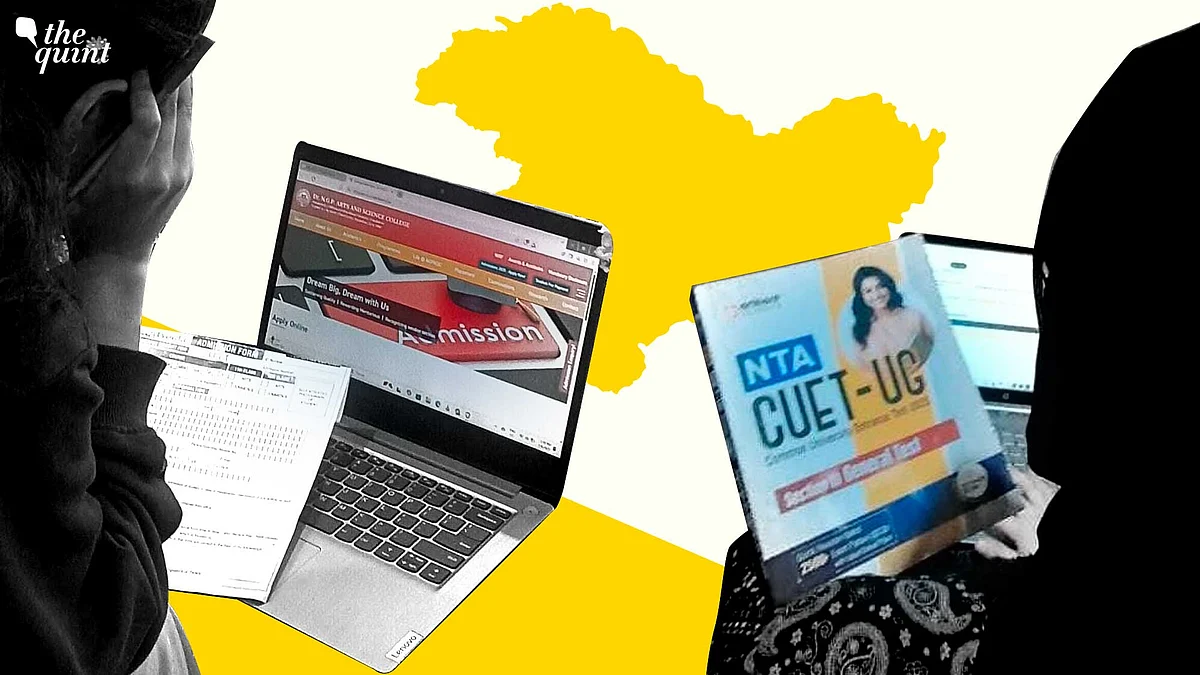Kashmiri Students Amid Indo-Pak Tensions: 'Every Time We Begin to Hope...'
As tensions between India and Pakistan escalates, uncertainty has once again gripped Kashmir’s student community.

advertisement
Outside a packed NEET examination centre in Srinagar on 4 May, 19-year-old Iqra Maqsood stood shivering. It wasn’t the early morning chill that unsettled her, but a WhatsApp forward warning of imminent war.
A medical aspirant from North Kashmir’s Tangmarg, Iqra was prepared for the examination. But instead of revising her notes, she was glued to her phone, tracking troop movements and viral videos, with a growing sense of dread.
"The exam went ahead as planned," she recalled. "But three nights later, around midnight on 7 May, I woke up to loud vibrations. The house shook. There were flares in the sky. My mother whispered, 'War has started'."
“Abbuji once said, 'Ab woh Kashmir nahi hai. Meri gudiya kahin bhi padhne jaa sakti hai' (it's not the same Kashmir as before, now you can go to study anywhere),” she recalled, her eyes welling up.
'Uncertainty Returns To The Valley'
In the wake of heavy shelling in villages along the Line of Control, as well as Pakistan's overnight missile offensive on 8 May, uncertainty has once again gripped Kashmir’s student community.
“Whenever there’s violence, we end up being the collateral damage,” said 18-year-old Munnazah, a JEE aspirant from Srinagar preparing for admission to IIT.
She referred to some of the recent reports of Kashmiri students being attacked in colleges outside the Valley. “I worry I’ll be next,” she said.
"I was locked in my room for a year, studying for one of the toughest exams in the country. My father works long hours to support me. Why should we be punished?" asked Munnazah.
'Ambitions Get Killed'
Dr Aabid Rather, a Srinagar-based psychologist who works with adolescents, said the current escalation has reopened "trauma circuits" for many young people.
"Repeated shutdowns — whether from lockdowns, conflict, or internet bans — create chronic stress loops," he explained. "Children feel unsafe, uncertain, and eventually, incapable of change. That’s learned helplessness. It doesn’t just affect academic performance — it kills ambition."
It’s a feeling 17-year-old Muhaib, from Kupwara, knows too well.
"My brother is a labourer. We barely survive. But education was our hope. Now even that’s fading."
In a village near Tangdhar, in Kupwara district, 16-year-old Areeba (name changed) lives less than 10 kilometres from the Line of Control. When Operation Sindoor was announced, she said it “sounded like thunder — but deeper.”
Her father reassured her, but sleep was elusive. “How can I not worry?” she asked.
The only girl in her class who wants to study law, Areeba’s home, damaged in earlier cross-border shelling, still bears scars.
‘We Aren’t Just Numbers, We Are Lives'
In Srinagar, 22-year-old Baseerat Mirani is drafting her statements of purpose for applications to Jawaharlal Nehru University and Jamia Millia Islamia. She hopes to study history and become a researcher.
While university admissions are ongoing across India, the J&K Board has delayed results. “It’s like we’re in a prison,” she said. “India and Pakistan should talk — with patience — and also think of us students. We aren’t just numbers. We are lives.”
Fabiha Bilal, a constitutional expert, said the frequent cycles of violence have created a “broken educational ladder” in Kashmir.
“Imagine climbing a ladder where every few steps, a rung is removed,” she said. “These students prepare for exams, but the system collapses every time there’s a flare-up. They’re left dangling between potential and impossibility.”
Back in Tangmarg, Iqra returns to her books. The power has just come back, and she has two hours before the inverter dies again. Her handwriting is tighter now as she rewrites notes on anatomy.
“I don’t know if I’ll get into a good college,” she said. “I don’t even know if I’ll get a result. But if I give up, what was the point of everything my father sacrificed?”